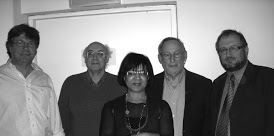“Make contact, create trust,” says journalist Benjamin Pogrund, on what the South African experience could offer Israel. He was part of a prestigious panel that provided a range of perspectives on how South Africa and Israel could help each other practically, economically and morally — if they want to.
 |
| Johnny Copelyn, Milton Shain, Rhoda Khadalie, Benjamin Pogrund and David Newman. |
Hosted by the Kaplan Centre for Jewish Studies and the SA Jewish Board of Deputies (Cape Council), the panel included businessman Johnny Copelyn, journalist Benjamin Pogrund, human rights activist Rhoda Kadalie and Professor David Newman from Ben Gurion University, with Professor Milton Shain of UCT in the chair.
The panellists took a range of approaches to the topic of how the two countries could assist each other. Professor David Newman, who specialises in geopolitics, briefly discussed how his field could play a role in resolving the conflict, and that the nature of negotiations is still very much based on land, borders and territory. However, discussions could also go beyond the geopolitical, and South Africa’s experience of these issues could provide new perspectives on resolving the conflict.
David focused on the relationship between Israel and Diaspora communities, and said that if we want the younger generation to believe in, support and even critique the state of Israel, we need to speak their language. Jewish youth of today do not see Israel fighting for its very existence. Rather, they speak in global terms, and for them to engage with Israel they need to see the role it plays in worldwide issues — whether this is poverty alleviation or cutting-edge technology.
David also discussed the growth of ‘left of centre’ groups in the United States and Europe, such as JStreet and the New Israel Fund, and noted that these are playing an important role in both Israeli and Diaspora discourses. He said that these groups are supportive of Israel while critiquing its government policies, but they do not
delegitimise Israel — “there are enough people out there who do!” — and should be supported. “We wouldn’t be the Jewish people if we didn’t have multiple opinions, and we need to create a broader tent,” he said.
Finally, David feels that people who are not in government need to facilitate dialogue between Israelis and Palestinians, and that South Africans could play a role in these meetings. “South Africa’s past is a means of seeing where there are bridges that can be built,” he concluded.
Creating connections
Rhoda Kadalie focused on practical ways that Israel and South Africa could help each other, and looked at challenges in achieving this. She said that although there are barriers to communication between the two countries, we can still lay the foundations for possible partnerships. She explained that South Africa could teach Israel aspects of conflict resolution that were key to the struggle — the most important being the suspension of violence and terrorism.
Meanwhile, she said that Israel has an abundance of economic, educational and technological assistance to offer South Africa. The Jewish state could lead foreign direct investment in Africa, educate about agricultural and water purification techniques, demonstrate how to integrate immigrants, and offer intense educational and economic support. However, she felt that anti- Israel attitudes in South Africa were hindering these opportunities.
Benjamin Pogrund agreed that Israel has much to offer South Africa in practical terms, and that the Boycott, Disinvestment and Sanctions (BDS) campaign was counter-productive in this context. In addition, South Africa could be a natural partner to Israel because it is uniquely placed to help due to its history. Benjamin said that the key lesson he learnt from South Africa was that creating connections and building relationships is the single most important factor for transition. “Enough people climbed over barriers, so that when the time came, they knew each other and had a basis for going forward.”
Johnny Copelyn focused on what the South African Jewish community could offer Israel, and said that it is essential that we work out what we want to defend and fight for. However, he said that in South Africa, if we try to “defend the indefensible,” our voices will not be heard. He felt that a stronger standpoint on issues such as settlements and the two-state solution are crucial for the community to put forward, and that openness to compromise would be a more realistic approach to take. But “if we say Israel is right on all matters — we won’t be heard.”











